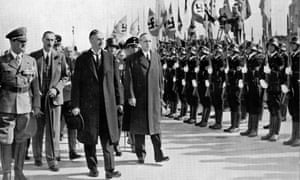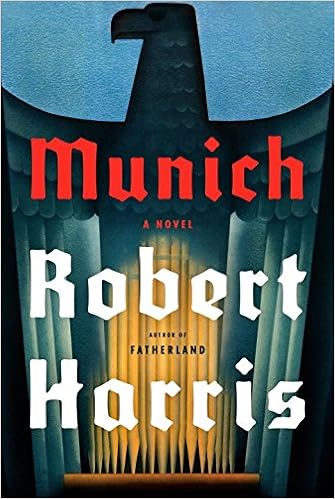Munich review – inside a compelling conspiracy on the eve of war
Robert Harris is on sure ground in this brilliantly constructed spy novel set amid the politicking of Chamberlain’s last-ditch negotiations with Hitler

Adolf Hitler, Neville Chamberlain and Joachim von Ribbentrop at Munich, 1938.
It’s one of the defining – and in hindsight humiliating – images of the 20th century: Neville Chamberlain stepping off the plane from Munich in September 1938 clutching a paper signed by Hitler and, later that day, declaring “peace for our time”.
The Munich agreement came against a backdrop of ultimatums from power-hungry leaders, devious negotiations and – unknown at the time – a conspiracy to overthrow Hitler with a plot straight from a spy drama. The perfect setting, then, for another thrilling historical novel from Robert Harris.
Harris is on sure and familiar ground in Munich – he quickly settles into the mid-20th century setting that made Fatherland and Enigma so compelling, and the claustrophobic feel of the conference carries on from last year’s exploration of Vatican politics, Conclave. Indeed, when Harris was political editor of the Observer in the late 1980s, he made a television documentary to mark the 50th anniversary of Munich: its title, God Bless You, Mr Chamberlain, says everything about how the much-maligned British prime minister is portrayed in his new novel.
History has not tended to treat Chamberlain kindly. But Harris is more sympathetic, making an intelligent case for a man who desperately believed he could – and should – avoid war, but put enough back-up plans in place for Britain to be able to fight one should the worst happen. In Munich, he’s a more shrewd operator than most historians would allow, undone by events and devious personalities rather than his own decisions.
But this is a novel, and against the intriguing backdrop of political machinations and brinkmanship is a thriller plot bursting to get out – though it doesn’t properly kick in until halfway through. A German diplomat, Paul Hartmann, and one of Chamberlain’s private secretaries, Hugh Legat, turn out to be long-lost university friends. Hartmann, uneasy at the seemingly obvious future direction of Hitler’s Germany, spies his chance in Munich to let Chamberlain know exactly what the Fuhrer has in mind for Europe. And it doesn’t include much diplomacy.

As Legat works out what Hartmann is trying to do – prevent Britain signing or, perhaps more importantly, believing in any kind of Munich accord – there are documents secreted in newspapers, guns hidden in toilets, escapes from shadowy Gestapo agents and late-night rendezvous. There’s a lot of smoking and sweating as they cheerfully admit that they’re rubbish spies.
It’s almost as if their bafflement at what they’re caught up in is shared by Harris – their escapades don’t quite work as a thriller in the context of a novel with such a determined fidelity to the facts. It’s true that some of their set-up mirrors the real-life Oster conspiracy in Germany to kill Hitler, but it’s not exactly edge-of-the-seat stuff, given the huge plot spoiler called the second world war, which rather restricts the opportunities for tension.
Still, Legat and Hartmann do have a higher purpose. It’s through their eyes that the narrative is structured, allowing Harris to contrast high-level politicking with the consequences of war for the people who will fight it. So Legat is immediately on the phone to his wife when he understands the severity of Hitler’s threats, telling her to take the children and leave London for the country. Hartmann is horrified by the rumble of a motorised division roaring through Berlin, and has first-hand experience of how the Nuremberg laws are affecting his friends.
Effectively, they are well-meaning men – with a few demons – caught up in a situation they don’t have the power to change. Harris is brilliant at depicting their world; prewar London, with its anti-aircraft guns, barrage balloons and searchlight batteries, is vivid, cinematic. Munich, too, is horrifyingly imperial, huge swastika banners on every building.
Most impressively, Harris rarely falls for lazily foreshadowing what is to come for the world; he concentrates on Munich in 1938, and its seismic convergence of corrupt and naive power. But he allows himself one memorable final comment on a man who valued peace. As Chamberlain steps off the plane waving his prized document, Harris imagines a “jagged black figure at the centre of a great bright light, his arm stretched out, like a man who had thrown himself on to an electrified fence”. Quite.
No comments:
Post a Comment